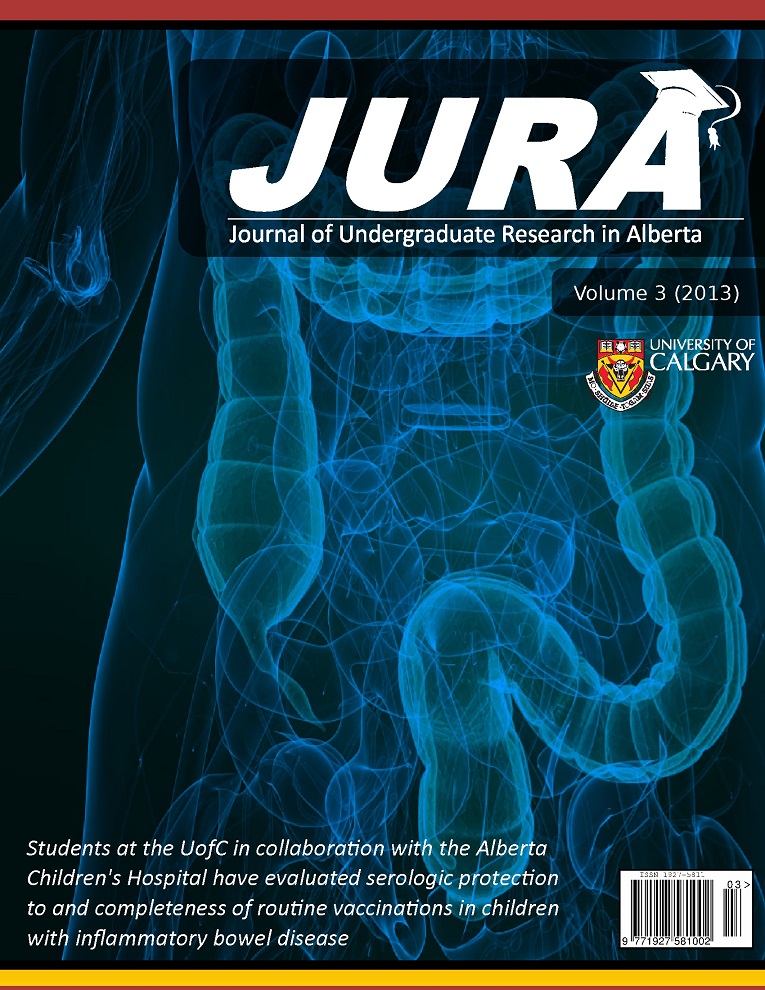Serologic protection to routine vaccinations in children with Inflammatory Bowel Disease
Keywords:
inflammatory bowel disease, vaccine, immunogenicity, booster dose, immunomodulatorAbstract
Background: Treatment for inflammatory bowel disease (IBD) frequently involves the aggressive use of immunosuppressants that increases susceptibility to and severity of other infections. Consequently, many individuals postpone or refuse immunizations due to unstable disease activity and of fear of disease exacerbation. The aim was to evaluate serologic protection to and completeness of routine vaccinations in children with IBD.
Methods: In this single-center cross-sectional study, children with IBD followed at the Alberta Children's Hospital were recruited from September 15, 2011 to August 15, 2012. Vaccination records and serum were collected for rubella, hepatitis A virus (HAV), and hepatitis B (HBV) virus serology and analyzed by the Provincial Laboratory of Public Health.
Results: 155 children with IBD underwent serum collection; complete vaccine records were available for 152 of these children. At enrolment, 93 participants (60.0%) were using immunosuppressive medications; an additional 30 participants had a history of medical immunosuppression. Of 155 participants, 69.7% had up to date MMR, DTap-IPV-Hib, and HBV immunizations. Of those who had completed the specific vaccinations, serologic immunity ranged from 61% to 79%, while the proportion of those on immunosuppressive medications ranged from 63% to 81%.
Conclusions: Children with IBD are at risk for vaccine-preventable illnesses due to lack of receiving complete vaccine series and mounting an inadequate serologic response to vaccinations. Serologic response to vaccinations was independent of immunomodulator therapy, suggesting that the immunosuppression is a consequence of the IBD diagnosis. Therefore, clinicians caring for patients with IBD should be conscientious about adherence to recommended vaccination schedules, measurement of immune response to vaccines, and administering booster vaccinations where appropriate.
Downloads
References
(2) Kappelman MD, Rifas-Shiman SL, Kleinman K, Ollendorf D, Bousvaros A, Grand RJ, Finkelstein JA. The prevalence and geographic distribution of Crohn's disease and ulcerative colitis in the United States. Gastroenterol Hepatol 2007;5(12):1424-9.
(3) Størdal K, Jahnsen J, Bentsen BS, Moum B. Pediatric inflammatory bowel disease in southeastern Norway: a five-year follow-up study. Digestion 2004;70(4):226-30.
(4) Canadian Immunization Guide 2006. Available at: www.phac-aspc.gc.ca/publicat/cig-gci/index-eng.php. Accessed September 1, 2012.
(5) Routine immunization schedule, Government of Alberta Health and Wellness. Available at: http://www.health.alberta.ca/health-info/imm-routine-schedule.html. Accessed September 1, 2012.
(6) North American Society for Pediatric Gastroenterology, Hepatology, and Nutrition; Colitis Foundation of America, Bousvaros A, Antonioli DA, Colletti RB, et al. Differentiating ulcerative colitis from Crohn’s disease in children and young adults: report of a working group of the North American Society for Pediatric Gastroenterology, Hepatology, and Nutrition and the Crohn's and Colitis Foundation of America. J Pediatr Gastroenterol Nutr 2007;44(5):653-74.
(7) Guide to lab services, Calgary Laboratory Services. Available at: http://www.calgarylabservices.com/. Accessed September 1, 2012.
Downloads
Published
Issue
Section
License
Authors retain all rights to their research work. Articles may be submitted to and accepted in other journals subsequent to publishing in JURA. Our only condition is that articles cannot be used in another undergraduate journal. Authors must be aware, however, that professional journals may refuse articles submitted or accepted elsewhere—JURA included.


